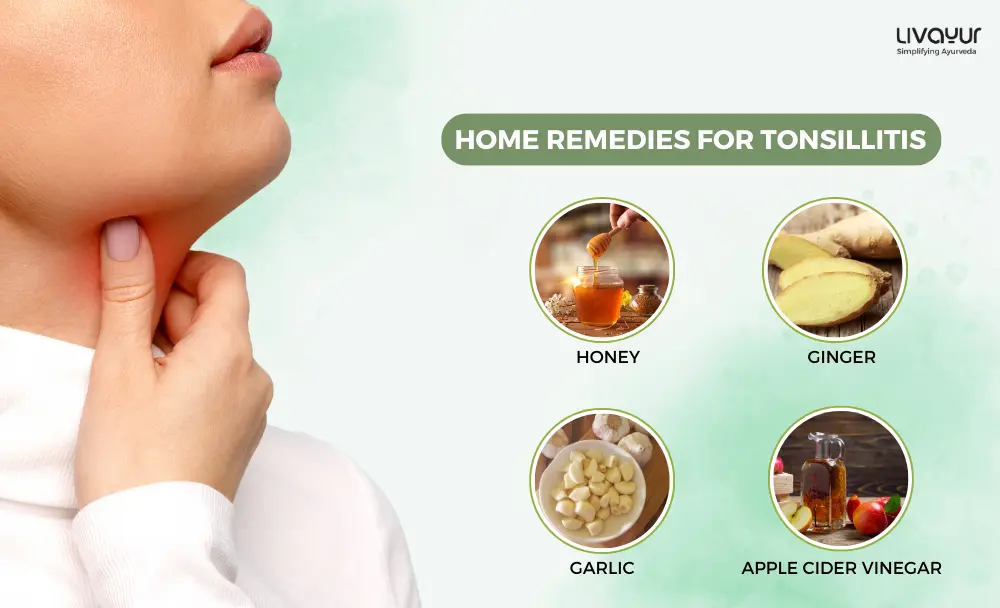
Tonsillitis is a condition where the tonsils, located at the back of the throat, become inflamed and swollen. It can be caused by bacterial or viral infections, and common symptoms include sore throat, difficulty swallowing, and fever.
Ayurveda views tonsillitis as a result of an imbalance of the Doshas, or energy forces, in the body, and seeks to restore balance through natural remedies and lifestyle changes. While antibiotics are commonly prescribed for tonsillitis, many effective home remedies can help alleviate the symptoms and speed up the healing process. In this article, we will discuss 10 effective home remedies to cure tonsils.
What are Tonsils?
Tonsils are two small glands located in the back of the throat, one on each side. They are part of the lymphatic system, which helps fight off infection and disease. Tonsils are made up of lymphoid tissue and play an important role in the immune system by producing antibodies that help fight off bacteria and viruses that enter the body through the mouth and nose.
However, tonsils can sometimes become infected themselves, leading to tonsillitis, which is characterized by inflammation and swelling of the tonsils. [1][2] Ayurveda views tonsillitis as a result of an imbalance of the Doshas, or energy forces, in the body, and seeks to restore balance through natural remedies and lifestyle changes.
What are tonsillitis causes?
The following factors outline the critical contributors to the onset of tonsillitis.
1. Viral infections
Tonsillitis commonly results from bacterial or viral infections that affect the tonsils. Among the bacterial infections, streptococcal bacteria, causing strep throat, is prevalent. [12]
2. Strep throat
Strep throat due to Streptococcus bacteria is a leading cause of tonsillitis. The bacteria can prompt an inflammatory response in the tonsils, resulting in sore throat and difficulty swallowing. [12]
3. Pharyngitis
Tonsillitis may also be associated with infections affecting other parts of the throat, referred to as pharyngitis. [12]
What are tonsillitis symptoms?
The presence of tonsillitis can be visible through the following symptoms.
1. Difficulty swallowing
Individuals with tonsillitis frequently experience difficulty swallowing, as the inflamed tonsils can cause discomfort. [12]
2. Ear pain
The discomfort can be from the pain originating from the inflamed tonsils or the infection spreading to the ear. [12]
3. Fever and chills
Elevated temperature is the human body’s natural response to infection, indicating an immune system response. [12]
4. Headache
The inflammation and infection can contribute to headaches and discomfort experienced with this condition. [12]
5. Sore throat (lasting longer than 48 hours):
The severity of the sore throat may vary. However, its prolonged duration can indicate an underlying issue requiring medical attention. [12]
6. Tenderness of the jaw and throat:
The inflammation of the tonsils can extend to surrounding tissues, leading to localized tenderness in these areas. [12]
7. Problems breathing
Enlarged tonsils, a common feature of tonsillitis, can obstruct the airway, leading to difficulties in breathing. [12]
8. Problems eating or drinking
Swallowing may become particularly troublesome, and dehydration can be a concern if adequate fluids and nutrition are not maintained. [12]
10 Home Remedies for Tonsils
1. Gargle with Salt Water
Gargling with salt water is a simple and effective home remedy for tonsillitis. Saltwater can help reduce inflammation, soothe the throat, and also kill bacteria in the mouth and throat. To make a saltwater solution, mix half a teaspoon of salt in a glass of warm water and gargle for 30 seconds, then spit out. Repeat this several times a day until symptoms improve. [3]
2. Pranayama
Practicing pranayama (breathing exercises) can improve respiratory function and boost the immune system while helping ease the symptoms of tonsillitis. [4]
3. Use Honey
Honey or Madhuka has mulitple health benefits. It is a natural antibacterial and anti-inflammatory agent that can help soothe the throat and reduce inflammation. Mix a tablespoon of honey with warm water or tea and drink several times a day. You can also mix honey with lemon juice and hot water for added benefits. [5]
4. Take Turmeric
Turmeric or Haridra is a powerful anti-inflammatory spice that can help reduce swelling and inflammation in the tonsils. Mix a teaspoon of turmeric powder with warm milk or water and drink several times a day. You can also add turmeric to your food or take turmeric supplements. [6]
5. Use Essential Oils
Essential oils, such as tea tree oil, lavender oil, and eucalyptus oil, can help reduce inflammation and kill bacteria in the mouth and throat. Add a few drops of essential oil to warm water and gargle for 30 seconds, then spit out. You can also add essential oils to a diffuser and inhale the steam. [7]
6. Use Apple Cider Vinegar
Apple cider vinegar is a natural antibacterial and anti-inflammatory agent that can help reduce inflammation and kill bacteria in the mouth and throat. Mix a tablespoon of apple cider vinegar in a glass of warm water and gargle for 30 seconds, then spit out. You can also mix apple cider vinegar with honey and warm water for added benefits. [8]
7. Eat Garlic
Garlic is a natural antibacterial and anti-inflammatory agent that can help kill bacteria in the mouth and throat and reduce inflammation. Chew on a clove of raw garlic several times a day or add garlic to your food for added benefits. [9]
8. Use Licorice Root
Licorice root is a natural anti-inflammatory agent that can help reduce swelling and inflammation in the tonsils. Brew licorice root tea and drink it several times a day or chew on a licorice root stick for added benefits. [10]
9. Use Ginger
Giner is a natural anti-inflammatory agent that can help reduce swelling and inflammation in the tonsils. Brew ginger tea and drink several times a day or add ginger to your food for added benefits. [11]
10. Rest and Hydrate
Resting and staying hydrated are important for fighting off infections and reducing inflammation in the tonsils. Drink plenty of fluids, such as water, herbal tea, and soup, and get plenty of rest to help your body heal.
It is important to note that these remedies may not work as standalone treatments for Tonsillitis but can complement conventional treatments and be used in the recovery process for patients who undergo surgery to have their tonsils removed.
Prevention strategies
Implementing the following strategies can mitigate the likelihood of the onset of tonsilitis.
1. Hygiene practices
Emphasize the importance of regular handwashing, especially after coughing or sneezing. Proper hand hygiene reduces the transmission of viruses and bacteria.
2. Avoiding contact with infected individuals
Tonsillitis is often contagious, particularly in cases of viral or bacterial infections. Avoid contact with people displaying symptoms of coughing or sneezing.
3. Vaccinations
Vaccinations targeting common bacterial and viral infections are crucial in preventing tonsillitis.
4. Smoking and second-hand smoke
Smoking and second-hand smoke exposure can lead to irritation the respiratory system and compromise the immune response.
5. Attention for sore throats
Individuals experiencing persistent or severe sore throats should seek prompt medical attention.
When to seek medical attention for tonsillitis
Individuals experiencing the following signs should seek medical evaluation.
1. Excess drooling in children
In young children, excess drooling, especially when accompanied by other symptoms of tonsillitis, may indicate severe inflammation or difficulty swallowing. [12]
2. Fever, 101°F (38.3°C) or higher
A persistent fever of 101°F (38.3°C) or higher indicates an ongoing infection. [12]
3. Pus in the back of the throat
The presence of pus in the back of the throat, often observed as white or yellow spots on the tonsils, may signal a bacterial infection like strep throat. [12]
4. Red rash
The development of a red rash, particularly one that feels rough and exhibits increased redness in the skin folds, may indicate a more systemic infection. [12]
5. Severe problems swallowing or breathing:
Individuals experiencing severe difficulties in swallowing or breathing due to tonsillitis should seek immediate medical attention.
FAQs
1. What are the symptoms of tonsillitis?
The most common symptoms of tonsillitis include sore throat, difficulty swallowing, fever, swollen tonsils, swollen lymph nodes, and bad breath.
2. What causes tonsillitis?
Tonsillitis is usually caused by a viral or bacterial infection, such as the common cold or strep throat.
3. When should I seek medical attention for tonsillitis?
You should seek medical attention if your symptoms persist or worsen, or if you experience difficulty breathing. Additionally, if you have recurrent or chronic tonsillitis, your doctor may recommend a tonsillectomy (surgical removal of the tonsils) as a more permanent solution.
4. How can I prevent tonsillitis?
You can prevent tonsillitis by practising good hygiene, such as washing your hands frequently and avoiding close contact with people who are sick, quitting smoking, and maintaining a healthy diet and lifestyle.
5. How is tonsillitis diagnosed?
Tonsillitis is usually diagnosed based on the symptoms and a physical examination of the throat by a doctor. In some cases, a throat culture or blood test may be done to determine the cause of the infection.
6. Can tonsillitis be contagious?
Yes, tonsillitis can be contagious if it is caused by a viral or bacterial infection. It can be spread through close contact with someone who is infected, such as through coughing, sneezing, or sharing utensils.
Conclusion
In conclusion, tonsillitis can be a painful and uncomfortable condition, but many effective home remedies can help alleviate the symptoms and speed up the healing process. These remedies can help reduce inflammation, kill bacteria, and soothe the throat, allowing your body to heal naturally.
Disclaimer: This article is from a health and wellness perspective only and does not constitute medical advice. Kindly seek the help of a trained medical practitioner before initiating any treatment.
References:
- How do the tonsils work? – InformedHealth.org – NCBI Bookshelf
- Tonsillitis – ENT Health
- Colds, flu and coughing: over-the-counter products for pharyngitis and tonsillitis
- Pranayama helps to boost immunity to fight against Covid-19
- Role of honey as adjuvant therapy in patients with sore throat
- Turmeric: A holistic Solution for Biochemical malfunction
- Immune-modifying and antimicrobial effects of eucalyptus oil and simple inhalation devices
- Antimicrobial Activity of Apple Cider Vinegar
- Study The Effectiveness Of Garlic Extract On The Growth Of Pathogenic Bacteria Causes Tonsillitis In Children
- Comparative Clinical Evaluation of Herbal and Allopathic Medicine in Acute Tonsillitis
- Phytochemical-rich medicinal plant extracts suppress bacterial antigens-induced inflammation in human tonsil epithelial cells [PeerJ]
- Tonsillitis





















I like this blog so much, bookmarked. “I don’t care what is written about me so long as it isn’t true.” by Dorothy Parker.